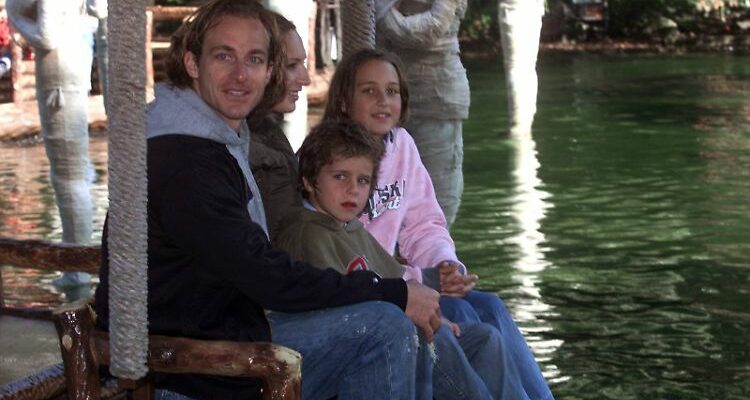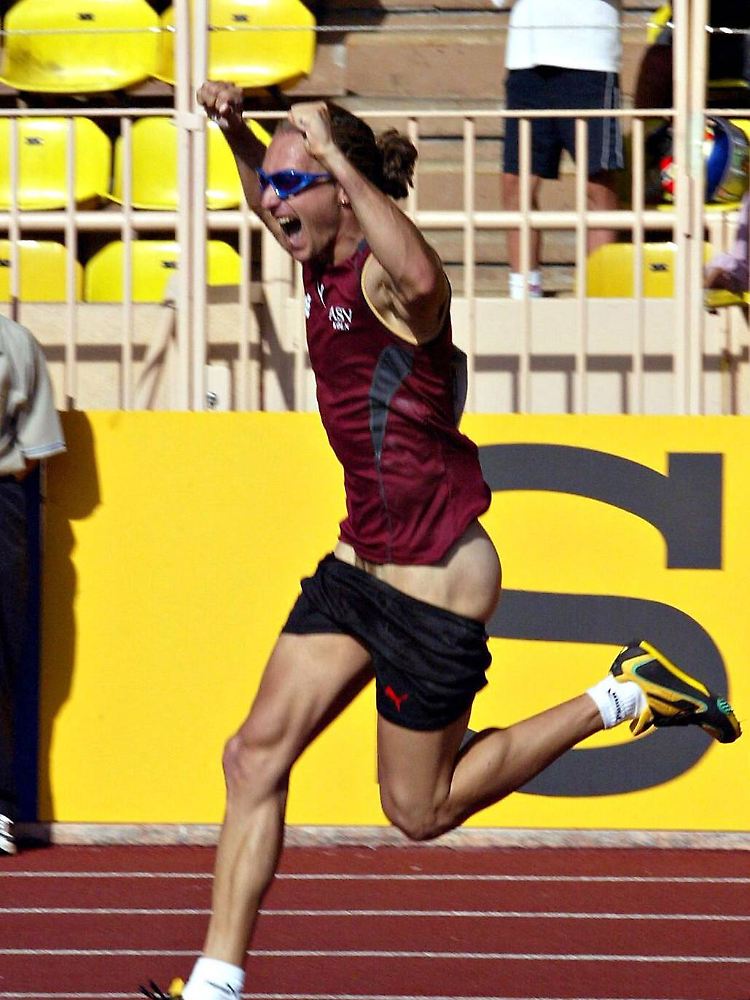Tim Lobinger decides his end as an athlete himself. After four Olympic appearances, he quietly quits his sport. Completely different from how he lived it during that time: as a loud eccentric with a ponytail and slanted glasses. He is now torn from life far too early, although he has already fought cancer once.
How do you prepare for a goal that you would prefer not to reach at all? During his many years as a pole vaulter, Tim Lobinger had perfected how he would prepare for the next competition. Born in the Rhineland, he wrote down every day, every training session and every competition during his career. He had accumulated several meters of diaries side by side.
Only one thing never came up in preparation as a professional athlete. The hardest fight. The one against your own death. He didn’t succeed. Lobinger dies at the age of only 50. His family said: “The former pole vault legend fell asleep peacefully in a small circle, he didn’t lose the fight, he won it in his own way.” Because Lobinger could still celebrate a few small victories in a life that seemed almost over a few years ago.
Collected many milestones
Soon after the end of his career, he had had to face the involuntary struggle before. Cancer got in the way of life after competitive sports. So, from 2017, the Munich native had fought again, no longer for heights and standards, but for his health. Facing leukemia, thanks to chemotherapy, thanks to stem cell transplantation, thanks to the solidarity of his family, his three children, his second wife Alina, although the separation had actually already taken place. He had successfully fended off the target of the insidious cancer. No death, instead life again, free of cancer cells and stable in health from 2019. Until he had to announce in March 2022 that the cancer was back. And will stay because, according to the doctors, he has no chance of healing.
From then on he should prepare himself – for his own death. Precisely the goal that he would prefer not to achieve so quickly, but which is not even there a year later. From then on he started collecting milestones. The most recent highlight: the birth of his granddaughter Fia. His daughter Fee, whom he was able to lead down the aisle last summer, gave birth to her first daughter just before Christmas. “The little one is incredible,” Lobinger enthused in the “Bunte”. “I always wanted to become a young grandpa.” Other milestones: his son Okkert starting school, which he missed due to an emergency operation, his son Lex-Tyger’s first professional goal, who plays with 1. FC Kaiserslautern in the 2nd Bundesliga.
There were moments that brightened his life, which made it clear to him again and again: “Losing is not an option” – that was the name of the book he wrote about his first fight against cancer in 2018. The direction was clear: keep fighting. Just like he had learned as a professional athlete. No longer according to a training plan, but according to a therapy plan. He survived 96 hours of chemo blocks with mental training such as breathing rhythm. Always hard on yourself – and on others.
At the age of 24, over six meters
It all started very early. At just seven years old, Lobinger already had a baton in his hand and jumped 2.01 meters. 3.99 meters should be added in the following years, right up to the magical 6 meter mark. On August 24, 1997, at the age of 24, he became the first German to jump six meters. At the ASV sports festival in the old Müngersdorfer Stadion in Cologne, it was the third attempt. Almost two years later he repeated this at the Golden League meeting in Oslo – right on the first try. The six meters is still the sound barrier for pole vaulters, nothing has changed in all these years.
Lobinger has always prepared meticulously. At every competition, at each of his four Olympic participations, which never went in his favour, at each of his eight outdoor world championships, at the European Championships indoors in 1998, in which he won gold, at the World Indoor Championships in 2003, in which he won crowned world champion, at the 2002 European Championships in Munich, where he won bronze in front of a home crowd, at the 2006 European Championships, where he took silver. He has experimented with the right hardness of the poles, whether magnesia, glue, resin or whatever concoction from the pole vault kitchen provides the best grip of the hands on the pole. With the right approach, with the perfect posture, with time management when turning over the bar.
The masses loved the eccentric
As an athlete he was dogged, but not careworn: “I never only cared about successes; I always had more fun in training than in a top championship experience. I still talk more about the party after my World Cup than about the World Cup itself.” , he once said. No wonder, the big events usually didn’t hold the greatest fun for him. Whether his decathlon in 1999 was a lot of fun is questionable in view of the exhausting sport, but it ended successfully for him. With a respectable score of 7346 points, he achieved 5.76 meters in the pole vault. With this height he holds the unofficial discipline world record within a decathlon. The name Lobinger has been in the history books for a long time. Even in the individual pole vault competition, he is still among the top 20 in the world with his six meters. Not many have climbed higher than the German, only three have rushed: Sergej Bubka, Renaud Lavillenie and today Armand Duplantis, who has now set the world record at 6.21 meters. For a long time no one has come anywhere near six meters from Germany.
And so Tim Lobinger is still one of the most famous pole vaulters in Germany, one that people talked about, one that the media loved. Precisely because he didn’t just make friends in his career. Although he was among the best in the world for many years, although his German record lasted 15 years until Björn Otto jumped one centimeter higher in September 2012. 6.01 meters. But Lobinger polarized, he knew how to stage and market himself. A guy who, with his curls tied in a ponytail and his often futuristic-looking sunglasses, attracted attention even during training in the rather dim hall. He quarreled with the association, accused some national coaches that their job was “a waste of money”, accused other athletes of a lack of professionalism, and even after his career could not understand why “ambitious, willing to compromise, slippery guys” were being used, and sometimes insulted them a teammate who defeated him in a crucial match and screwed up a huge jackpot.
Unforgettable is the scene from 2003 when he bared his butt at the World Finals in Monaco after winning with 5.91 meters and bagging the $30,000 jackpot. “I’ve had to swallow so much this year that you can explode,” said Lobinger. “I do not regret it.” He was particularly angry with a judge who had previously invalidated a flight over 5.86 meters because he had pushed the bar back onto the support with his hand. Also a little thing for which the extroverted Lobinger was notorious. He received a $5,000 fine for his bare bottom, a lot of criticism from his own association – but also notoriety, represented by giggling behind his hand, whether the photos that captured his frivolous cheering forever. Incidentally, these were not Lobinger’s first nude pictures, as early as 1997 he had himself photographed without clothes for “Stern”.
From competitive sports to trainers for top athletes
It was also his big ego, the argumentative, the loud speaker, the polarizing that made Lobinger interesting away from the jumping facilities of this world. He had several dealings with Stefan Raab. In 2001 he was supposed to teach him his sport for the “Raab in Danger” format, later he was a candidate for “Schlag den Star”. He participated in “Let’s Dance” in 2011, in other game shows. His career was already coming to an end. Although he took part in the Olympic Games for the fourth time in 2008, he had already failed in the qualification. He had already passed his performance peak, he was no longer able to build on the six meters, he had also jumped over 5.80 meters for the last time in 2007. While he kept talking about the next big attack, the national elite gradually outstripped him.
There was no great excitement at the end, as was so often the case in his career. The official confirmation was nothing more than the announcement of his future: In July 2012, the then regional football club RB Leipzig announced that Tim Lobinger would be the new athletics coach. It became career after career for him that he was already working towards. While still an active athlete, he supervised the Belarusian midfielder Alexander Hleb and goalkeeper Michael Rensing in their training work. He was active in Leipzig until 2016, then he moved privately to Munich, where he specialized as an athletic coach for top athletes. Among other things, he looked after Joshua Kimmich, whom he met in Leipzig and with whom he was a close friend.
It was supposed to be a fulfilling future, which was cut short by the diagnosis of leukemia. “I’ve never asked myself the question ‘Why me?’ Because that’s pointless, nobody can answer that,” he said at the end of October last year when he, as patron of the “Research Helps” foundation, presented sponsorship awards for Würzburg cancer research. He said to himself at the first diagnosis: “I now have cancer. And with this cancer, the next round of my life begins.” So Lobinger fought – to the end. That’s what he had learned as a little boy with the long pole vault, that’s what he had always asked of himself. But the cancer does not stick to the most meticulous training plan.

